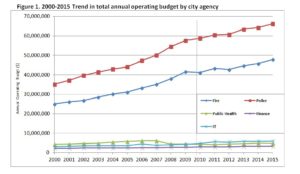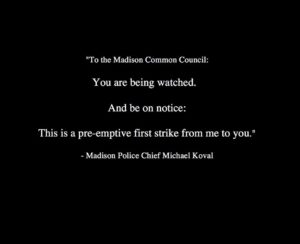Every year the police are the most political at budget time – Chief Wray was a little more smooth than Koval – but they don’t act like the other departments. I wish Community Services would do the same thing they do – just one year. But when us alders tried, we got put in our place. Anyways, when they submit their budgets, the police always have a memo. Other departments don’t do this. Here’s this years . . . grab a bucket.
But first, because its my blog, I get the first word . . . 3 minutes and 30 seconds . . . how would this change if we had community control over the police?
If you’re not a video person – here’s the highlights . . . not the same without the graphs and visuals. The video is also a facebook post here.
– Police Budget in 2016 = $67.5M – the largest budget
– Total budget = $289.5, police are 23%
– They’ve had a 88.41% increase in their budget over the past 15 years
– Officer involved shootings cost us millions, and our insurance goes up
– The city has grown in population by 18% since 1999 – personnel has grown by 18%, but the police have a 30% increase in staffing
– Midtown Station is going to take a significant amount of our taxes in the next few years and it will be at the cost of something . . .
Ok, now Koval.
July 20, 2016
To: Mayor Paul Soglin and all City Alderpersons
From: Michael C. Koval, Chief of Police
Subject: Madison Police Department 2017 Operating Budget ProposalDuring these challenging fiscal times, I have again conducted a comprehensive needs analysis, attempting to identify the primary resource needs for the Madison Police Department (MPD). The annual process of identifying budget priorities involves reflection, analysis, and vision. It combines the work of balancing existing resource needs with anticipated service demands. As such, it is a process guided by our mission and core values and one that incorporates input from citizens and policymakers, while mindful of our role as guardians tasked with ensuring public safety. The key budget concerns for the MPD moving forward were developed in conjunction with our main priorities for policing in 2017. The following goals and priorities for 2017 are consistent with our commitment to providing excellent police services – services rooted in partnership with our community:
– Completion of Midtown District Station
– Address Staffing Deficits
– Address Increasing Violence
– Expand Community OutreachThe completion of the Midtown District Station furthers our longstanding priority to decentralize services by literally moving us closer to our constituents. Citizens living in the West and South districts do not currently receive the level of responsive services comparable to other city residents. I have often stated that my job as Chief is to stress initiatives that will enhance public safety. In the many listening sessions I have attended thus far in my tenure, a consistent message that rings loud and clear from residents in the area of the city that Midtown will serve, is that they strongly support the construction of the Midtown Station. While some policymakers have suggested that we temporarily adjust existing district boundaries, and shuffle current resources between the Central, South, and West districts, the reality is that these three district stations are already at capacity and cannot accommodate additional staff. In addition, this recommendation does not consider the impact if the City annexes the Town of Madison sooner than the adopted timeline. The completion of the Midtown Station, and the added personnel resources that it provides, will in essence create a watershed to collect the overflow from the surrounding districts and more evenly distribute the workload thereby providing more equitable police services across the city. Although the budget instructions did not allow us to request the added staff that has been previously discussed as required for the Midtown Station, I still want to highlight that, if Midtown is to open in 2018, we will need to add the seven commissioned positions in the 2017 academy.
The Department, and in fact the entire City, has been committed to a decentralized community policing model for decades. During this same period of time, population growth has outpaced our success in receiving authorization to steadily add to our commissioned strength to the extent necessary, despite several staffing study recommendations highlighting the need for added staff. As such, police resources are currently spread too thin, and the resulting workload imbalance across our existing districts has created a service equity concern. In my two previous budget processes, I forecasted the need for additional staff – additional officers for more equitable patrol services; additional detectives for follow-up on investigations that increasingly grow more complex; additional command/supervisory staff (especially sergeants) to provide guidance in the field and to specialized units such as our Mental Health Officer team; additional staff for the Midtown District Station; and additional civilian staff to support all the aforementioned functions. To address these ongoing staffing needs, while mitigating the short-term fiscal impact to the City in adding personnel, I had directed staff to explore grant opportunities. Not only do grant-funded programs bolster staffing numbers, they allow for innovative approaches to providing police services and incorporate many of the tenets outlined in the President’s Task Force on 21st Century Policing aimed at community engagement, building trust, and enhancing restorative justice initiatives. An example of such a program is our newly implemented Community Outreach & Resource Education (CORE) team.
In addition to grant-funded positions and programs, with the support of elected officials, I have created several premium service units that more effectively meet the needs of our community. Through reassigning existing staff as Mental Health Officers (MHO’s), Neighborhood Resource Officers (NROs), and the violent crime and burglary crime units (VCU & BCU), we have substantially improved our ability to address emerging crises and crimes in a timely manner.
The combination of grant-funded positions and internal staffing adjustments demonstrates creative approaches to implementing value-added services focused on community policing strategies. Guardianship is most effective when it is proactive, not just reactive. While fielding calls for service is the backbone of policing, effective guardianship demands more and community outreach initiatives and specialized services are essential proactive community policing/problem- solving efforts aimed at prevention and support. Without the surety of adequate staffing to cover basic services, premium services such as these described will likely be necessarily reduced or eliminated.Staffing is inextricably linked to the quality and scope of services MPD is able to provide and to adequately meet the measure of service that residents have come to expect from their police department. In the first half of 2016, the city experienced over 40 cases of shots fired and six homicides. At this pace, we are heading toward one of the most – if not the most – violent years this community has ever seen. To best address this increase in violence requires not only an ability to react as crimes are committed, but to work proactively to prevent violent crimes from occurring. In order to effectively address ongoing changes, the City will need to make difficult choices in regards to the level of staffing and resulting level of service they desire.
Since becoming Chief, I have held as a priority a focus on expanding community outreach initiatives. Community trust is born of the quality of police-citizen interactions, the equitable and consistent provision of services (fairness) and the extent to which individuals feel that they have been treated with dignity and respect. It is, in essence, solely dependent on the integrity of the relationship. These relationships are cultivated not just through our response to police calls for service, but in the myriad ways we create opportunities to connect outside of a call-driven approach. This is why community outreach efforts are imperative to our mission. They are how we build trust. Our budget priorities for 2017 flow one into the other. The completion of Midtown brings with it increased access to police services through improved response times, moving closer to those we serve, and the addition of staff. Increased staffing allows us to address longstanding deficits and to maintain existing premium proactive service programs. These proactive services in the form of specialized units (Gang Officers, Neighborhood Officers, CORE, MHO, etc.) combine to provide the community outreach opportunities that build trust and lead to more effective outcomes.
I can say without hesitation, that this year’s budget directives severely undermine my ability to address these established priorities for 2017 and for years to come. Directives such as not requesting any additional staff, either through supplements or grants, providing a proposal to eliminate our 2017 academy entirely, and the delay of construction of the Midtown Station, will all limit MPD’s efforts to move forward with proactive policing initiatives.
The directive regarding the potential elimination of the pre-service academy is particularly troubling. At a time when I have gone on record stating the need to develop a strategic staffing plan (i.e. the addition of 40 officers over the next 4 years) to address our Department’s ever increasing staffing shortages, the Mayor’s budget directives disallow any such requests. The reason for my concern is that today I have 90+ officers at or over the age of 50. Of these, approximately 30 officers are 53 years old and have at least 25 years of service, which is the baseline for full retirement. At some time, these officers will decide to retire. At that point if there has not been a pre-service academy to quickly replace them, the volume of vacancies are likely to result in rolling back not only premium service units, but decreasing the types of calls we will respond to at all. If we do not field an academy in 2017, this will result in a projected 10-30 fewer officers available to provide police services to our residents. As it stands, if we delayed the start of an academy until early 2018, because of the time it takes to fully train each officer, the MPD will have to function significantly below authorized levels. This shortfall will continue into 2019 and the Department will be no further ahead in addressing our existing staffing shortages. Eliminating the cost of an academy in 2017 will yield short-term savings, but the impact on our service delivery in 2018 and 2019 is much harder to quantify. I will certainly do my part in the difficult but necessary work of siphoning excess and improving efficiencies where I can, but objective staffing needs can only be ignored for so long before a dramatic shift in public safety services results.
I have done my best to lay out my concerns as well as my goals for 2017. Although I recognize the fiscal constraints which the City faces, I trust we will be able to work together to find appropriate solutions to address these and other emerging issues for public safety.
Respectfully,
Michael C. Koval, Chief of Police
Well, it was tame for him, but he was clear. I’m guessing this is going to be a big budget fight, but this time, its with the mayor, as it was his budget directives.
Now we know what his “pre-emptive strike” was all about . . .










